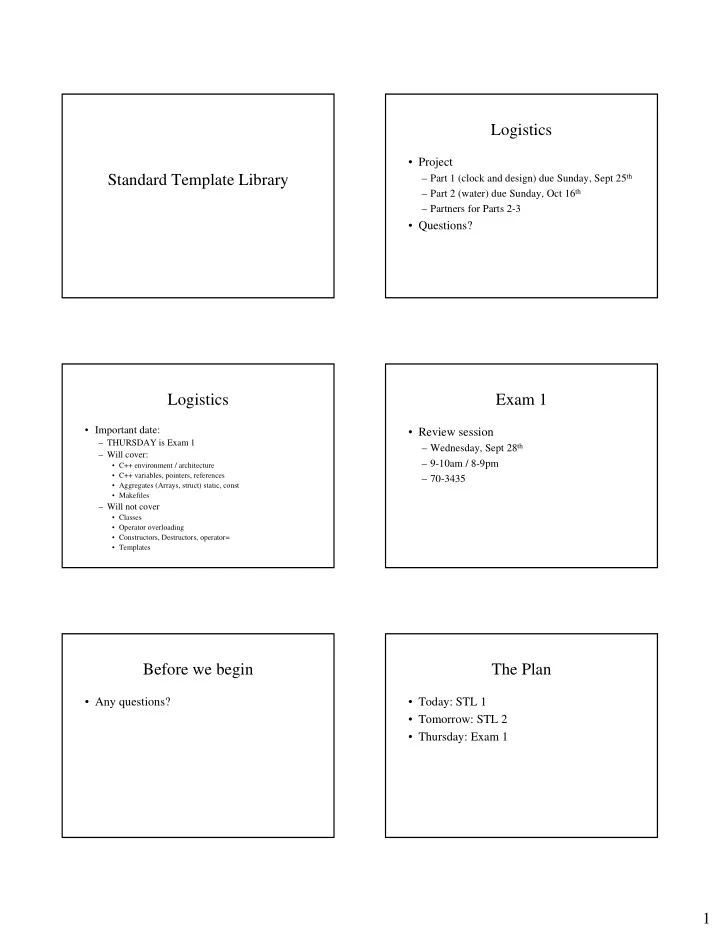

Logistics • Project Standard Template Library – Part 1 (clock and design) due Sunday, Sept 25 th – Part 2 (water) due Sunday, Oct 16 th – Partners for Parts 2-3 • Questions? Logistics Exam 1 • Important date: • Review session – THURSDAY is Exam 1 – Wednesday, Sept 28 th – Will cover: – 9-10am / 8-9pm • C++ environment / architecture • C++ variables, pointers, references – 70-3435 • Aggregates (Arrays, struct) static, const • Makefiles – Will not cover • Classes • Operator overloading • Constructors, Destructors, operator= • Templates Before we begin The Plan • Any questions? • Today: STL 1 • Tomorrow: STL 2 • Thursday: Exam 1 1
A quick intro to Templates A quick intro to Templates template <class T> • To use this template: Datatype to be class Queue filled in later { // a queue of ints private: Queue<int> iqueue; T *q; int n; // a queue of doubles … Queue<double> dqueue; public: void enqueue (T i); // a queue of aClass objects T dequeue(); Queue<aClass> aqueue … } // a queue of pointers to aClass Queue<aClass *> aptrqueue The Standard Template Library STL Components • A general-purpose C++ library of • containers algorithms and data structures – classes that hold stuff • Based on a concept known as generic • iterators programming – Used to iterate through containers • Implemented by means of the C++ – Generalization of C++ pointers template mechanism • generic algorithms • Part of the standard ANSI C++ library – Templated functions • util package for C++ STL Components Sample code using STL #include <vector> • function objects (Functors) #include <algorithm> – Objects that overload operator(); #include <iostream> – Substitute for pointers to functions using namespace std; • adaptors vector<int> v; – adapt other components to special purposes. for (int i = 0; i < 25; i++) v.push_back(i); – Queues and stacks are adaptors random_shuffle(v.begin(), v.end()); • Allocators for (int j = 0; j < 25; j++) cout << v[j] << " "; – encapsulate a memory model. – decouple the algorithms from assumptions about a ... particular model. 2
Simple Containers Vectors • vector • Will grow in size as you add stuff to them – Smart array • Add to the end of the vector (push_back) – Grows dynamically • Can insert (but expensive) – Random access (overrides []) • list • Remove from the end of the vector – Doubly-linked list (pop_back) – Sequential access • Can remove from middle (expensive) • deque – Double ended queue. • Random access (via operator[]) – Best of both vector and list Vector Lists #include <vector> • Can add to front or back #include <algorithm> #include <iostream> • Can insert (efficient) • Can remove from front, back, or middle using namespace std; (efficient) vector<int> v; for (int i = 0; i < 25; i++) v.push_back(i); • No operator[] random_shuffle(v.begin(), v.end()); for (int j = 0; j < 25; j++) cout << v[j] << " "; Lists Deque #include <list> • Can add to front or back #include <algorithm> #include <iostream> • Can insert (efficient) • Can remove from front, back, or middle using namespace std; (efficient) list<int> v; for (int i = 0; i < 25; i++) v.push_back(i); • Random access (operator []) for (int j = 0; j < 25; j++) { cout << v.front() << " "; v.pop_front(); } 3
Deque Adaptor #include <deque> • Wrapper class #include <iostream> • Converts the interface of one object to using namespace std; another deque<int> v; • Hides the interface of the original object for (int i = 0; i < 25; i++) v.push_back(i); cout << v[13]; for (int j = 0; j < 25; j++) { cout << v.front() << " "; v.pop_front(); } Adaptor Queue // Accessors Queues and Stacks are Adaptors -- Take in Container Templates bool empty () const; size_type size () const; -- replaces it's own methods value_type& front (); const value_type& front () const; template <class T, class Container = value_type& back (); deque<T> > const value_type& back () const; class queue {...} void push (const value_type&); void pop (); Stack Questions? // Accessors bool empty () const; size_type size () const; value_type& top (); const value_type& top () const; void push (const value_type&); void pop (); 4
Iterators Iterator Types • Iterators are used to step through elements • Some pointers are smarter than others in STL containers – forward_iterators – reverse_iterators – bidirectional_iterators • Written to emulate C/C++ pointers – const iterators – operator++ to iterate forward – Random access iterators – operator-- to iterate backwards – operator* to dereference. Iterator Types Getting Iterators – List // Iterators • All container methods that return a position in the container will return it as iterators iterator begin (); const_iterator begin () const; iterator end (); • Each container has predefined types for the const_iterator end () const; iterators it returns. reverse_iterator rbegin (); list<int> I; const_reverse_iterator rbegin () const; reverse_iterator rend (); list<int>::iterator it = I.begin(); const_reverse_iterator rend () const; Using Iterators Random Access Iterators • Allow for C-style pointer arithmetic’ list<int> I; list<int> I; list<int>::iterator it = begin(); list<int>::iterator it = begin(); it+= 4; while (it != I.end()) { cout << (*it); // Prints out 5th element of I. it++; cout << (*it); } 5
Summary • Standard Template Library • Simple Containers • Iterators • Next Time: – More complex containers – Algorithms – Function Objects 6
Recommend
More recommend